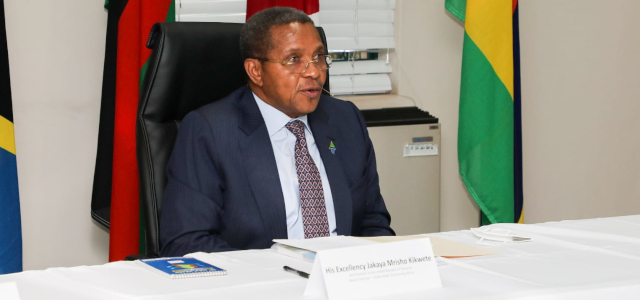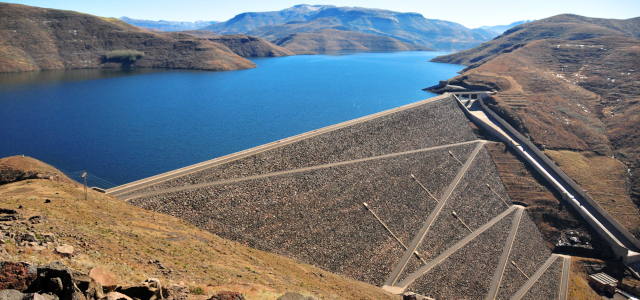The event was hosted by H.E. President Jakaya Kikwete, Chair of Global Water Partnership Southern Africa and Africa Coordination and H.E. Dr. Ibrahim Mayaki, CEO of the African Union Development Agency-NEPAD, and attended by leaders from the African Ministers’ Council on Water, World Bank, African Development Bank, Development Bank of Southern Africa, and the Global Centre on Adaptation who expressed intent to collaborate in the process

Urgent need to accelerate water and sanitation investment in Africa
“In the face of the overwhelming challenge that the Covid-19 pandemic has brought to our continent, the need for urgent and significant investment in African water and sanitation resources has never been clearer,” said H.E. President Kikwete, the 4th President of the Republic of Tanzania.
He indicated that the African Development Bank (AfDB) estimates that US$ 64 billion in water infrastructure investment is required annually to meet the 2025 Africa Water Vision of water security for all. Actual investments stand between US$10 – US$19 billion per year.
“Support at the highest leadership level is needed to accelerate water investments, combined with considerations for an economic analysis for water resources,” added H.E. President Kikwete.
The AIP Water Investment Scorecard will work with African governments to track progress and identify bottlenecks in attracting investments to achieve Sustainable Development Goal 6 on water and sanitation.
This data-based narrative for water security is expected to improve the investment outlook for water and sanitation and increase domestic and regional financial resources allocated to the sector, develop local financial instruments and markets, and mobilise financing.
Embedded within the African Union Development Agency’s PIDA-PAP II
The AIP Water Investment Scorecard supports the implementation of the AIP (Continental Africa Water Investment Programme) which was adopted by the African Heads of State as part of the second phase of the African Union Development Agency’s 2021 – 2030 Programme for Infrastructure Development in Africa Priority Action Plan (PIDA-PAP II).
Speaking during the online event, Dr. Ibrahim Mayaki highlighted that as custodians of the PIDA-PAP II implementation, AUDA-NEPAD has instruments which will inform the indicators of the AIP Water Investment Scorecard. The instruments support quality preparation of projects; mitigate financial risks for projects; mobilise political support for projects; and share information on projects.
“The AIP Water Investment Scorecard is a very valuable tool to mobilise water investments through mutual accountability for results,” said Dr. Mayaki. “Its success will depend on the commitment of African Union member states, regional communities, and development partners.”
A central repository for water investment knowledge
“The AIP Water Investment Scorecard aligns very well to the Pan-African Water and Sanitation Sector Monitoring System, AMCOW’s web-based system that helps in tracking progress across the water and sanitation subsectors, respectively,” said Dr. Paul Orengoh, Deputy Executive Secretary at the African Ministers’ Council on Water (AMCOW).
“Our visioning for the AIP Scorecard is to see this grow to become much more than just a way to track progress in water investments across the continent, but also a central repository for investor intelligence on water and sanitation infrastructure,’ he added.
AIP partner network will address the obstacles to investments
One of the key obstacles to investment in water infrastructure in Africa is project preparation. “We intend to support the AIP Water Investment Scorecard in closing the investment gap for water with a new project preparation facility as part of the recently established Africa Adaptation Acceleration Programme,” said Prof. Anthony Nyong, Regional Director at the Global Centre for Adaptation and Director of Climate Change and Green Growth at the African Development Bank. “The facility will mobilise US$ 5billion in water investments in Africa by 2025.”
Mr. Chuene Ramphele, Group Executive: Infrastructure Delivery Division at the Development Bank of Southern Africa (DBSA) also stressed the critical importance of supporting project preparation in the drive to accelerate water investments.
DBSA hosts the SADC Water Fund which invests in water infrastructure development in the Southern African Development Community (SADC). The DBSA committed to supporting the African countries in the preparation and implementation of projects as well as in broadening the funding mix through blended financing in the water sector.
“This Scorecard will help us understand where the water investment gaps are and allow us to track performance regarding the transition of investments into implementations,” said Mr. Ramphele.
AIP Water Investment Scorecard will leverage support from local financiers
Closing the water investment gap in Africa, will depend on increased financial support by regional financial institutions.
Speaking on behalf of the African Development Bank (AfDB), it’s Chief Financial Analyst for the Southern Region Water Sector, Mr Mecuria Assefew, said that the AfDB supports the development of the AIP Water Investment Scorecard as a tool for measuring progress and ensuring accountability, adding that the AfDB undertakes to increase its support to its regional member countries to strengthen water, energy, and food security.
A tool to improve gender equality and youth involvement in the water sector
One of the goals of the AIP is to support gender equality in the water sector, where the burden of water insecurity and climate change is disproportionately shouldered by women.
“Scorecards can be a powerful way to increase gender transformation and equality in projects,” said Dr. Catherine Tovey, Water Practice Manager for East Africa at the World Bank Group.
Mr. Dario Soto-Abril, CEO: Global Water Partnership echoed the need for the AIP Water Investment Scorecard to reflect the lived experiences of gender and youth, in an effort to increase women’s decision making in the planning and implementation of water investments.
“We need practical data that goes beyond numbers and tells us the human experience across the intersections of gender, age, etc. We also need data that is sourced from across partnerships,” said Mr. Dario Soto-Abril, CEO: Global Water Partnership. “This is how we will be able to connect the theory and solutions in water.”
Next steps on the AIP Water Investment Scorecard development
The kick-off event – which was attended by close to 200 African water sector stakeholders, including African governments, Regional Economic Communities, and development agencies – was the first step in the consultative process to develop the AIP Water Investment Scorecard.
“We are here to gather stakeholder inputs on the AIP Water Investment Scorecard; what it should focus on, what indicators need to be tracked and the thematic areas of water investments,” said Mr. Alex Simalabwi, Executive Secretary of Global Water Partnership Southern Africa and Africa Coordination, who facilitated the event.
In co-facilitation roles during the stakeholder participation were UNICEF, World Health Organisation, the Food and Agriculture Organization, International Water Management Institute, United Nations Environmental Programme, DBSA, International Union for Conservation of Nature, United Nations Industrial Development Organization, AUDA-NEPAD, United Nations Development Programme, Stockholm Water Management Institute, and Global Water Partnerships across Africa and the Mediterranean.
The AIP Water Investment Scorecard comes on the back of effective initiatives in the African agricultural and health sectors. The Comprehensive Africa Agriculture Development Programme is a performance evaluation system based on a balanced scorecard approach, while the African Leaders Malaria Alliance, which works with African Heads of States and the African Union to enhance accountability for results in the fight against malaria, also makes use of scorecard accountability.
Its development was initiated following a high-level brainstorming meeting held On 11 November 2020, H.E President Jakaya Kikwete, and H.E Dr Mayaki Ibrahim, CEO of AUDA-NEPAD hosted a high-level meeting with leaders from AfDB, DBSA, and COMESA. The meeting reached consensus on need for the AIP Water Investment Scorecard.
